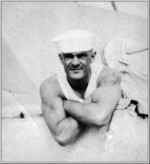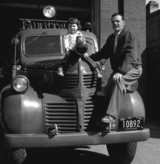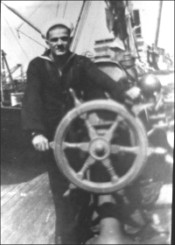
Voices From The Past ... Hurley, Wisconsin |
Many readers will recall that my father, "Peno" Endrizzi, served as Hurley's chief-of-police for many years during Mayor Bonacci's administration. Subsequent to that, he served for 8 years as fire steward prior to moving to Wisconsin Rapids where he resided until his death in l996. Following in the steps of his older brother Bill, he enlisted in the Navy in 1916 and again in 1943, having served in both world wars .. We are fortunate in having preserved on tape a couple of interviews recorded when he was 80 years old. The first one follows: _____________________________________________________ "The Von Steuben, the Leviathan, the Kaiser Wilhelm, the Wilhelmina, the Princess Irene, and the Friedrich der Grosse were all ships taken over from Germany when war was declared in April of 1917. This occurred in New York harbor. These ships were then used by the U.S. for troop transport. Our ship, formerly Friedrich der Grosse, was renamed the USS Huron. These ships were stripped and bunks were put in all the available space. Where they used to put cargo, they put in bunks set up in tiers, five and six high. "Normal crew size when used for passenger service was somewhere around a hundred. But for troop transport service, we had about 600 in the crew. There's a lot of deck work, you know. I'm counting the stewards, and the kitchen crew, etc. We carried a total complement of from 3000 to 3500 for each crossing. "I went into service in 1916. The Huron was my first ship after leaving Great Lakes. In between I was furloughed, and I reported back about 4 months later and they sent me to New York by way of Minneapolis. There I boarded the Huron and stayed with her until after the war when we brought troops back to the states. I made a total of 13 round trips on the Huron. Our destination in the states was sometimes Newport News, Norfolk, or Brooklyn - mostly Brooklyn. Our trips abroad were made mostly from Hoboken. "Our convoys ranged from about 18 to 30 ships. I never travelled on the Leviathan. Because of its speed, it travelled alone. The Leviathan was close to l000 feet in length. It carried 10,000 men. We always landed in France - never in England. Some did, but not ours. We landed in Brest, St Lazaire, and Bordeau. Our trip time ranged from 11 to l3 days. The big ships made it in about 5 days. Besides discharging our troops, we had to unload cargo and take on coal. We were there about 6 days. Coming back, we didn't have much of a cargo at all -- until the war ended. There were always a certain number of hospital cases -- the sick and the wounded that we took back -- usually about a hundred or a hundred and fifty. "Everyone was housed below deck. During the storms the water would sweep right across the decks. The ship would nose down into the water, and the water would come up all the way over the whole top of the ship. My position was helmsman. I was at the wheel steering the ship, under the command of the officer of the deck. "The best speed we could make was about l4 knots an hour, whereas the Leviathan would make between 20 and 22 knots. We encountered submarines but there was never a hit in our convoy. In one instance the convoy that left a day ahead of us had one ship knocked off. "On one occasion, about 3 or 4 days out of New York, we experienced a collision. When that happened we were still able to turn around and get into port in New York. Most of the crew on our ship was transferred to other ships. But I was one that stayed. In two or three weeks time we were ready to go out again. |



"The ship that hit us was the sister ship Princess Irene. It struck us in the bow. This happened during maneuvers and somebody got his signals crossed. I was not at the helm, but on duty shortly after that. We were working two hours on and six hours off. There were no injuries. This happened during the day. The collision took a good chunk out of the bow. It ripped a hole about l0 or l2 feet below the water line. But the ship was compartmentalized and this prevented water from entering the rest of the ship. "Food was served on deck. We sailors ate at table in our mess hall, but the troops would fill their mess kits from huge kettles and eat standing up wherever they could. It was remarkable the way they were all taken care of. "Latrines were set up along the bow of the ship. They were constructed out of 2 by 12/s. Just a regular trough. That's all it was. Water would run through, and when the ship was heaving, you had one hell of a time. That's when I was glad I wasn't a deckhand. That's when they had to go to work. "(My sister) Ida used to send me food. One time she sent a pie that arrived just after we had left for France. It was there when we got back. I don't know how it got by the mail that way. It was covered with green mold. "Pay was $36.00 a month. I'd send $25.00 to Pa. "After the war the Leviathan was used as a receiving ship and I was transferred to it for a short period. From there I was transferred to New Orleans where I spent about 2 1/2 months. Then it was back to Boston aboard the USS Florida and I still had about a year of service left to go. From there we made a trip to the West Indies, Barbados and Trinidad and Guantanamo. I got out in August of 1920." ______________________________________________ I rediscovered some tapes of conversations with Dad about 30 years ago. I typed them up an sent them on to the Miner in hopes they will print same. Following is a transcript of second taped interview of Dad dated about 1978: "Jack Johnson was out making an exhibition tour; that was after he was dethroned as (boxing) champion. He was a really good boxer and fighter. He could do both -- box and fight. And Red Erspamer got up and fought with Jack Johnson in Bonino's Hall. I think Otto (Erspamer) and I put on a exhibition bout -- a preliminary to this fight. Jack Johnson fought Red Erspamer and several other locals from Ironwood and Hurley. He couldn't get any more big fights so he was making a tour through the country and stopping at all the jerk-water towns and he was scheduled to fight at Bonino's Hall this night. "There was a fellow from Hurley -- he was one of the Secors and related to Fa Secor's dad, Matt Secor, the old barber. The called him China Mascot. He lived out on the west coast and when they were putting on a boxing match at Bonino's Hall in Hurley, they got China Mascot all the way from California to fight some known lightweight, or a bantam-weight, And this was, oh golly, 1914 or 15, when we were just kids, see -- maybe l3. And when we went up there and got into the ring, you'd think it was grudge match the way we went after each other. It ended up as a draw, but we pounded the hell out of each other. "The China Mascot was a really good fighter, classified in the regular fight ring. I can't recall who he fought at that time. It was a 10-round fight. They had some pretty good fights in those days. They used pretty light-weight gloves in those days. I guess they were 4- or 6- ounce gloves. An when you were hit, it was just like a kick, for heaven's sake. "I had a couple of matches in the navy, but I didn't go too far. I wound up in a battle royal, as I may have told you. There were 6 of us in the ring -- three soldiers and three sailors, and I wound up the winner. They asked for volunteers and I was sitting up on a beam across the ring. We had these big beams that worked automatically to lift the cargo. The ring was set up in the middle of the deck just under one of these beams. I was up on top where I could see everything and I was looking down at the proceedings there and they were asking for volunteers. They needed one more guy and so, even without giving it a thought, I jumped down, about 20 feet into the ring. I took off my shirt and my blouse and they strapped the gloves on me and then the three soldiers and three sailors were lined up on the side of the ring and when the bell rang we all mingled together. "This was while we were in troop transport. We were transporting troops across to France. Roy Allen was there and he took a picture of that and gol darn it, I don't know what became of that picture. The only one I can remember is a man by the name of Terussi. He was a pretty-good-size guy and he weighed about 175 pounds. Of course I went in there at a hundred and thirty, thirty-five pounds. That was my regular weight. And then there were these other fellows -- the 3 soldiers and the other sailor. I don;t know who he was but I know he was a fireman, and he was a big strapping guy. One of the soldiers was also a good-sized guy. The big soldier and the big sailor got together and we assisted the sailor in getting after the big guy and so we got him out of the way right away. Then the three of us went after the other two soldiers. These soldiers were in and of course were bouncing around. They had a hell of a time trying to catch ahold of me because I'm skirting around and I was always hitting from the back. Finally we got rid of all three soldiers. So then there were just we three sailors left. "So, I looked at Terussi and I said "Listen, now. If you want to save your hide, you better assist in getting rid of this big fellow, see." So Gene started after him and I was in the back, pommelling him from the back. He turned around to gouge at me and Terussi would come in -- he was a pretty good fighter, this Terucci -- and so finally, we didn't have to knock him out, you know, just so long as you knocked him down. That was the end of it, you see. So, finally we knocked him down. And then Terucci and I wound it up and I had the better win and outlasted him and he had to quit and so I got the hundred bucks. That's when I made my trip over to Paris. And this John Backis -- he died just a year ago, and oh how I wanted to go out and see him -- we made the trip together to Paris. He was my buddy. "This was on the USS Huron. The fight wasn't planned ahead of time, but developed to provide entertainment. The boat was about 550 to 560 feet long. It was formerly the German ship Friedrich der Grosse --- one of several ships we took over in New York harbour at the outbreak of the war. The Princess Irene was a sister ship and she was in convoy all the time. We travelled in a pack of between 15 to 25 ships. We had some action, but never lost any ships. Submarines were sighted a couple different times and we had destroyers along with us and when we'd sight submarines we would spread out and the destroyers would make a big round circle and they'd drop depth bombs. On two occasions we saw the oil come up . We also saw stuff floating around after the hits. We had 5-inch guns, and I was gun captain of one of these guns. "We took over one of the Roosevelt brothers -- Quentin, I think it was. We carried about 3500 men on each trip." |